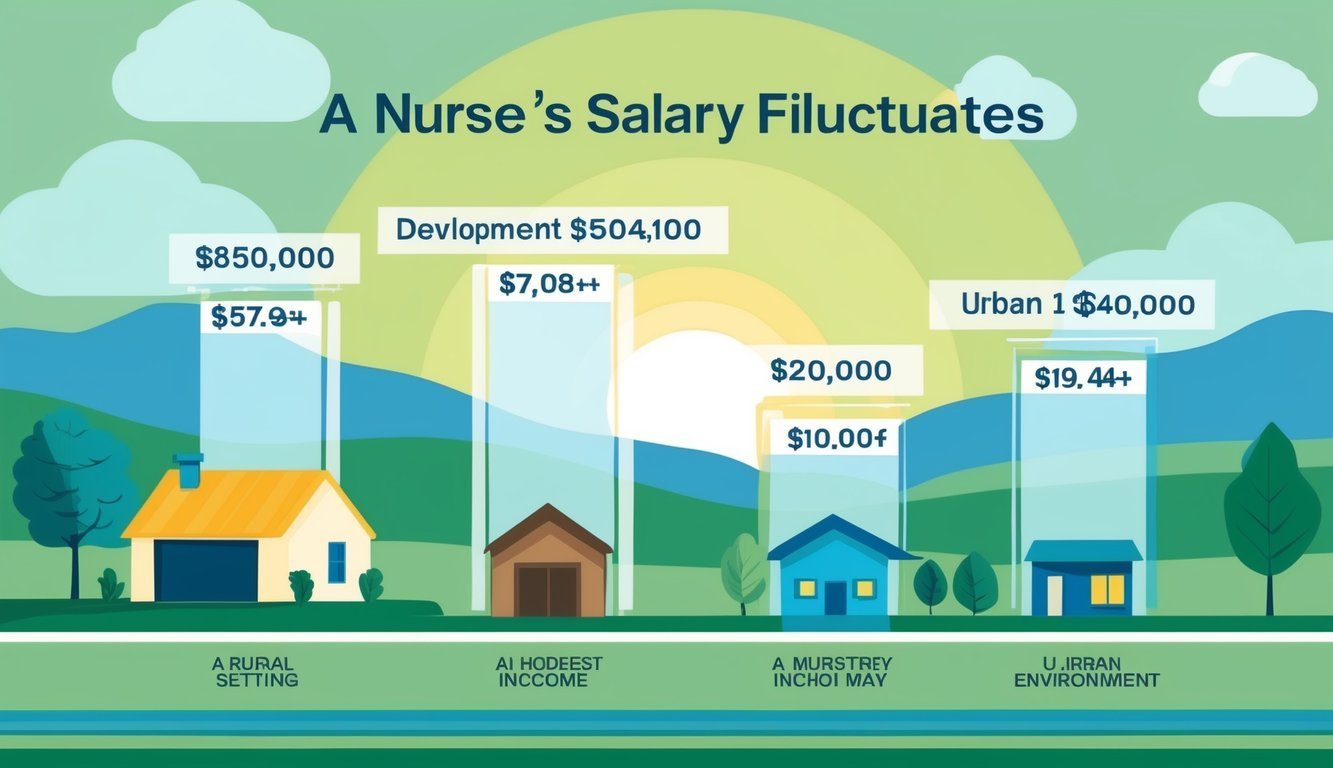Nursing is a vital profession and can be very rewarding, both personally and financially. Registered nurses earn about $89,010 annually or $42.80 per hour on average. This salary can vary greatly based on factors like location, experience, and specialization.
Many people wonder how much nurses truly make and what influences these numbers.
In this article, you’ll discover what you can expect to earn as a nurse, and explore how different states and specialties affect nursing salaries.
You’ll also learn about the available opportunities in the nursing field and how your education impacts your pay.
By the end, you will understand the current landscape of nursing salaries and the factors that contribute to your potential earning power.
Key Takeaways
- Nursing salaries are influenced by location, experience, and education.
- Specializations can lead to higher earnings and more job opportunities.
- There is a strong demand for nurses, which positively impacts job security and salary growth.
Understanding Nursing Salaries
Nursing salaries can vary significantly based on several factors.
These include the type of nursing role, level of education, and geographical location.
Understanding these variables will help you make informed decisions about your nursing career.
Variables Influencing Nurse Salaries
Several key factors influence how much you can earn as a nurse.
One major factor is location.
Certain states or cities pay higher salaries due to demand, cost of living, and healthcare needs.
Another factor is experience.
Nurses with more years of experience typically earn higher wages.
For example, a newly hired registered nurse may start at a lower salary compared to a nurse with five or ten years in the field.
Specialization also plays a role in salary.
Roles such as a Certified Registered Nurse Anesthetist (CRNA) or Nurse Practitioner (NP) often come with higher pay due to the required advanced skills and education.
Comparing Salary by Nursing Roles
Different nursing roles come with distinct salary levels.
Here’s a quick overview:
| Nursing Role | Average Annual Salary |
|---|---|
| Registered Nurse (RN) | $89,010 |
| Nurse Practitioner (NP) | $131,309 |
| Licensed Practical Nurse (LPN) | $48,820 |
| Certified Nurse Midwife (CNM) | $112,829 |
| Certified Registered Nurse Anesthetist (CRNA) | $195,610 |
| Certified Nursing Assistant (CNA) | $31,680 |
These averages show how specialized roles can significantly impact your earnings.
For example, a CRNA typically earns much more than an LPN due to the additional education and training.
Nurse Salary by Education Level
Your level of education greatly affects your earning potential.
Generally, more education leads to higher salaries.
- Certified Nursing Assistant (CNA): Requires minimal education, average salary around $31,680.
- Licensed Practical Nurse (LPN): Usually requires a diploma, with an average salary of $48,820.
- Registered Nurse (RN): Associated with a degree in nursing, average salary is about $89,010.
- Nurse Practitioner (NP): Requires a master’s degree, with a salary averaging $131,309.
As you can see, advancing your education can lead to significant salary increases and more job opportunities in the nursing field.
Geographical Impact on Nursing Income

The income of nurses can vary significantly based on where they work.
Understanding how geography affects salaries helps you make informed decisions about your nursing career.
Highest-Paying States for Nurses
Certain states offer much higher salaries for registered nurses (RNs).
For example, California ranks as the highest-paying state, boasting an annual median salary of $177,670.
Here’s a quick look at some of the top-paying states:
| State | Average Annual Salary | Average Hourly Wage |
|---|---|---|
| California | $177,670 | $63.78 |
| Hawaii | $129,970 | $62.53 |
| Massachusetts | $155,100 | $74.55 |
| Oregon | $104,990 | $50.48 |
| Alaska | $118,490 | $56.87 |
For more detailed information, check this resource on the highest-paying states for nurses.
Comparative Analysis of RN Salary by State
The salary of RNs varies widely across the U.S. In places like West Virginia, the average annual salary is only $72,230, which is over $15,000 less than the national average of $89,010.
This difference highlights the geographical disparities in nursing income.
For instance, states in the Northeast tend to offer higher salaries compared to Southern states.
Additionally, the cost of living in these regions also plays a significant role.
In states like Alabama, the average nursing salary is $65,900, while in larger cities, the numbers are often much higher.
If you want to see a broader overview, visit this analysis of nursing salaries across the USA.
Understanding these variances allows you to better evaluate your salary expectations and job opportunities.
Specializations and Advanced Practice
Nurses have various pathways to increase their earnings through specializations and advanced practice roles.
These paths can offer significantly higher salaries and unique responsibilities in the healthcare system.
Advanced Practice Registered Nurse Salaries
Advanced Practice Registered Nurses (APRNs) include nurse practitioners, certified nurse midwives, clinical nurse specialists, and certified registered nurse anesthetists (CRNAs).
Their advanced training allows them to provide comprehensive care in various settings.
Average Salaries for Different APRNs:
| Role | Average Annual Salary |
|---|---|
| Nurse Practitioner | $120,680 |
| Certified Registered Nurse Anesthetist | $174,790 |
| Clinical Nurse Specialist | $106,756 |
| Nurse Midwife | $117,674 |
These roles often require a Master of Science in Nursing (MSN) or higher, which contributes to their elevated earning potential.
Specialty Nursing Careers and Pay
Specialty nursing careers allow you to focus on specific fields of healthcare.
This specialization can lead to higher job satisfaction and compensation.
Examples of Specialty Nursing Roles:
- Women’s Health Nurse Practitioner: Average Salary – $101,569
- Orthopedic Nurse Practitioner: Average Salary – $100,035
- Acute Care Nurse Practitioner: Average Salary – $157,580
Each specialty requires unique training and certification.
The skills gained in these roles make you a key player in patient care.
For more details on salary and roles, you can visit Nursing Process for a detailed overview.
Comparing Salary of Nursing Education and Credentials
The level of education you attain as a nurse can significantly impact your salary.
Understanding these differences can help you make informed decisions about your nursing career.
Impact of a BSN on Salary
Earning a Bachelor of Science in Nursing (BSN) often leads to higher salaries compared to an Associate Degree in Nursing (ADN).
Registered nurses (RNs) with a BSN typically earn more due to their advanced training and skill sets.
For example, the average annual RN salary is around $89,010.
In contrast, RNs with a BSN may earn upwards of $94,480 per year.
Salary Breakdown:
| Degree Type | Average Annual Salary |
|---|---|
| ADN | $83,000 |
| BSN | $94,480 |
This difference highlights the financial benefits of pursuing a BSN.
Many employers prefer or even require BSN-level education, which can lead to better job opportunities and promotions.
Average Pay for Master’s Prepared Nurses
Nurses who go further in their education by obtaining a Master of Science in Nursing (MSN) often see even greater salary increases.
The median salary for MSN-prepared nurses is approximately $129,480 annually.
These nurses usually work in advanced practice roles, such as nurse practitioners or clinical nurse specialists.
The investment in your education can yield significant returns.
Average Salaries for Various Roles:
| Role | Average Salary |
|---|---|
| Certified Nurse Practitioner | $128,490 |
| Clinical Nurse Specialist | $120,000 |
Embarking on a path toward an MSN can open many doors in your nursing career, both in terms of salary and job responsibilities.
The Job Market and Career Outlook for Nurses

The nursing job market continues to grow, offering various opportunities and competitive salaries.
With the increasing need for healthcare services, the demand for nurses is expected to rise for years to come.
Nursing Job Demand and Salary Outlook
The demand for registered nurses (RNs) is strong.
According to the U.S. Bureau of Labor Statistics, more than 203,000 new registered nurse positions will be created each year from 2021 to 2031.
Median Annual Salary:
- As of May 2023, the median annual wage for RNs was $86,070.
- The average hourly RN salary is around $42.80.
Job Growth:
- The nursing field is projected to add about 371,500 jobs from 2018 to 2028.
- This growth rate is faster than average when compared to other occupations.
The increase in jobs reflects the growing need for healthcare services in various settings, including hospitals, clinics, and home health.
Pursuing online nursing programs can be a good choice for those looking to enter the field more quickly and efficiently.
The Role of Travel Nurses and Salary Trends
Travel nurses play a vital role in addressing short-term staffing shortages across the country.
These professionals take assignments in different locations for limited periods.
Salary Trends:
- Travel nurse salaries often surpass those of permanent staff nurses, averaging over $100,000 annually.
- Pay varies based on location, specialty, and demand, often including bonuses or housing stipends.
Work Environment:
- Travel nurses may work in various settings, providing flexibility and adventure.
- They may choose assignments that suit their career interests or preferred locations.
Travel nursing can also lead to substantial savings, as many positions cover living expenses.
This career path is ideal for those seeking both financial and personal growth while contributing to healthcare needs.
Frequently Asked Questions

In this section, you will find specific information about nursing salaries, including annual ranges, comparisons between roles, and how experience and specialization can affect earnings.
These details can be useful when considering a career in nursing.
What is the annual salary range for nurses in the United States?
The annual salary for nurses in the U.S. typically ranges from around $60,000 to over $100,000.
Factors such as location, experience, and type of nursing role can greatly influence these figures.
For example, recent data shows that registered nurses can expect to earn a median salary of approximately $86,070.
How does the salary of a Nurse Practitioner compare to that of a registered nurse?
Nurse Practitioners (NPs) generally earn more than Registered Nurses (RNs).
On average, NPs can expect annual salaries in the range of $100,000 to $110,000.
In contrast, RNs typically earn about $86,070 annually.
This difference reflects the additional education and responsibilities NPs have.
What are the hourly wage expectations for nurses across different states?
Hourly wages for nurses vary significantly by state.
Below is a general overview of the average hourly rates for nurses in selected states:
| State | Average Hourly Wage |
|---|---|
| California | $55 – $70 |
| Texas | $40 – $50 |
| Florida | $35 – $45 |
| New York | $50 – $65 |
| Illinois | $45 – $55 |
These rates can depend on various factors including cost of living and demand for nurses.
What is the average monthly income for nurses in the healthcare industry?
The average monthly income for nurses in the U.S. is roughly $7,200.
This figure can vary based on the specific role and geographical location.
For example, in higher-paying states like California, monthly incomes can exceed $9,000.
How do nursing salaries vary with experience, from new graduates to veteran nurses?
Experience plays a significant role in determining nursing salary.
New graduates typically start at around $60,000 annually.
With 5-10 years of experience, this can rise to about $80,000.
Veterans with extensive experience, especially in specialized fields, can earn upwards of $100,000 or more.
Which specialization within nursing commands the highest income?
Certain nursing specializations tend to offer higher salaries compared to others.
Specialties such as Certified Registered Nurse Anesthetists (CRNAs) often lead the field.
They can earn an average annual salary exceeding $200,000.
Other high-paying specialties include Nurse Practitioners in certain fields and Nurse Midwives.

